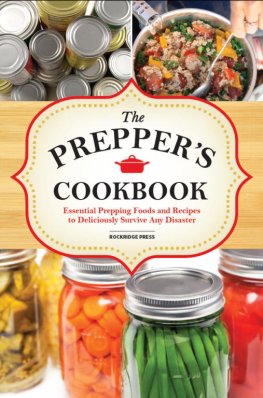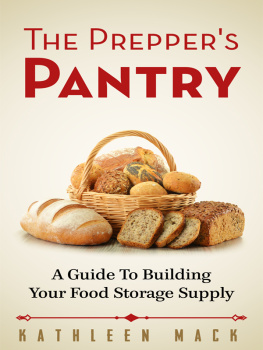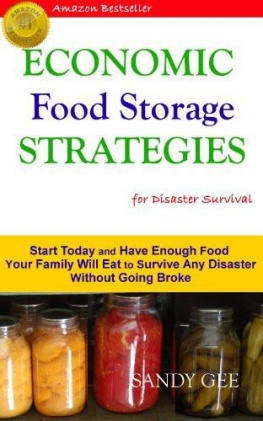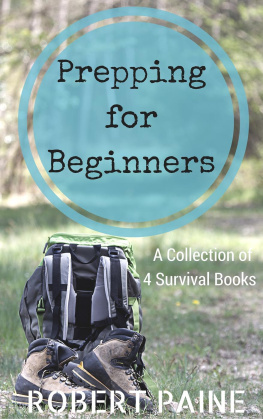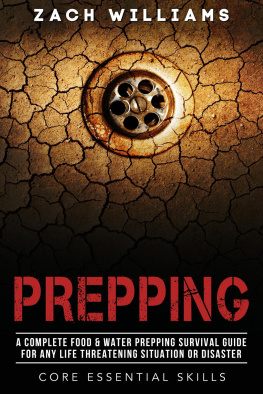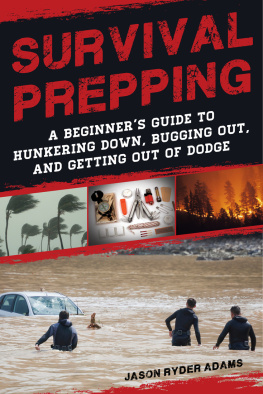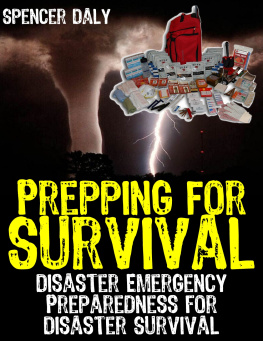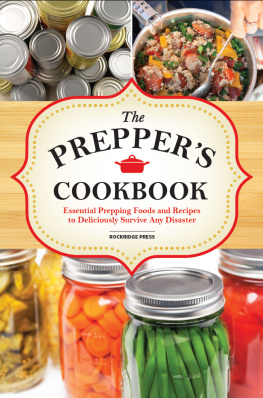Long-Term Survival Bible
A Prepping Guide to Protect Your Family in a Worst Case Scenario | Start to Stockpiling Food, Living Off the Grid, Canning Recipes, Survival Techniques to Prevent Societal Collapse.
Contents
INTRODUCTION
Even in this day and age, food shortages are a reality. Floods, blizzards, earthquakes, hurricanes, and a variety of other natural and man-made calamities can cause power outages and, as a result, food scarcity. It is only prudent to prepare ahead of time in order to ensure your and your family's survival. You can meet your nutritional demands with a pantry stocked with canned, pickled, fermented, or dry foods. Isn't it difficult to keep track of an entire pantry and stock other essential items? Yes, in a nutshell. But not if you fully comprehend the process and employ the appropriate tactics. Yes, it will take time and work on your part, but having food security and safety in times of need makes it all worthwhile. Starting with pantry essentials to food storage recommendations, tactics, tools and methods, food and supplies list, survival gardening, composting and waste management, this preppers guidebook covers everything you need to know about preparedness.
CHAPTER 1: WHAT DOES IT MEAN TO BE A PREPPER
A prepper is someone who has the foresight and knowledge to look ahead and plan for events that may affect his or her life. These people improve their knowledge and abilities, acquire supplies, and form communities that work together for the common good. Preppers take reasonable precautions to prepare for the future while also taking time to appreciate the present. Planning ahead and recognizing potential dangers and needs is a fantastic strategy to reduce the impact of a disaster or emergency on your life. Preppers are wise individuals who recognize that change is an unavoidable part of life. We're planning for events that are almost certain to occur, such as natural catastrophes, power outages, and financial difficulties, all of which are a part of everyone's lives. We are self-sufficient.
Why Become A Prepper?
We invite you to join us as we prepare to face life's difficulties. Understanding the advantages of becoming a prepper might just persuade you to become a prepper yourself. Here is the list of advantages that compel most people to become preppers:
"Be Prepared"
The Boy Scouts of America trains our children to be prepared at all times. Being prepared can be understood to suggest that you are always mentally and physically prepared to perform your duties. Scouts are taught to plan ahead of time by imagining possible scenarios so that they will know what to do and be prepared regardless of the accident or event that may occur. Scouts are also taught to be physically prepared so that they are strong and capable of carrying out their duties. They must have the physical resources to meet essential fundamental necessities.
Our Ancestors Were Preppers
Have you considered that many of your forefathers and mothers were preppers? Being a "prepper," as we call it nowadays, has historically boosted your chances of surviving the winter. It was a fundamental aspect of life to stock up on supplies and preserve the harvest. During World Combat II, victory gardens were the standard, and individuals who planted them were regarded as war heroes.
Take on Life's Challenges
Every day, we prepare for the thousands of minor things that life throws our way. For example, our family consumes 3 to 6 months' worth of food on a daily basis. This eliminates the need for a last-minute dash to the store to pick up a missing component. This family reserve allows us to weather financial storms such as job loss, unforeseen illness or medical bills, car repairs, or a last-minute family vacation.
Makes Life Easier
Life is full of anxiety and tension. It is possible to lessen stress by being prepared. With a well-stocked pantry, you'll always be able to prepare a meal or snack on a chocolate bar. Prepping reduces the number of trips to the grocery store, giving you more time to accomplish the activities you enjoy.
Strengthening Communities
Preppers are a valuable addition to the communities they live in. They are self-sufficient and possess the required skills and abilities to help their society thrive. Preppers get together every day, as well as when tragedy occurs, to aid one other regardless of age, colour, culture, socioeconomic level, or religion. Many preparedness enthusiasts are members of amateur radio networks or have received training from local Community Emergency Response Teams (CERT). When calamity comes, prepared people are not only ready to care for themselves and their families but also to reach out and bless the lives of others.
Prepping Brings Peace
Some survivalist mindsets are based on fear. They store everything because they are afraid of what might happen in the future. Fear isn't a valid excuse to start preparing. The "things" you own does not provide security. We prepare because it provides a lot of calm to our lives. We have no idea what the future holds for us. We prepare for religious reasons, as do many others, as well as because it makes sense. As we watch the events of the world unfold, we may rest easy knowing that we have done everything we can to prepare and can trust God to take care of the rest.
Have More With Fewer Things
It is easy to use a credit card to buy premade food and pricey toys with the intention of saving them for "someday." Preparing entails much more than simply buying "things" to keep on hand in case anything unexpected occurs. As you go along your readiness path, something interesting happens. Preppers are taught to value resources and minimize waste. We learn to solve problems and do things on our own. We gain abilities that allow us to be far more self-sufficient than we ever imagined.
Debt-free Life
Debt is a crushing burden with a ruthless taskmaster. Preppers aim to live within their means and avoid debt as much as possible. They devise inventive strategies to achieve essential objectives while staying within their budget. Preppers' abilities are frequently applicable to part-time work to supplement their income. Many preppers strive for financial stability, money in the bank, and a hoard of cash or precious metals. A debt-free life offers a distinct level of freedom. It might be early retirement, more disposable cash, or the ability to leave a job you don't like.
Prepping Builds Self-Confidence
Preppers seize opportunities to learn new things and improve their skills. Preppers are constantly thinking about "what if" scenarios that allow them to weigh various options and mentally plan the best course of action. As they seek to become ready for everything, kids build self-confidence as a natural result of acquiring and improving these talents. When youngsters are involved in this process, they gain greater confidence in their capacity to face the storms that will inevitably emerge in their lives.
Less Dependency on Government
Have you noticed some of the preparations that the administration is making? They're amassing supplies. Many government leaders are quiet planners. It's possible that their deeds speak louder than their words. Preppers are not reliant on the government for their survival. They recognize the need for stockpiling provisions that will allow them to be self-sufficient. They choose not to compete for the limited resources that the government may or may not distribute.
CHAPTER 2: HOW TO START PREPPING
Most people panic during the early stages of prepping because they don't know where to start. Once you set the right pace, everything automatically starts falling into place. There are a few preparation steps that every Prepper must start with, and as you get going with those, you can introduce your own ways as well. At the end of the day, it is all about being prepared- so do whatever it takes you to stay prepared.


